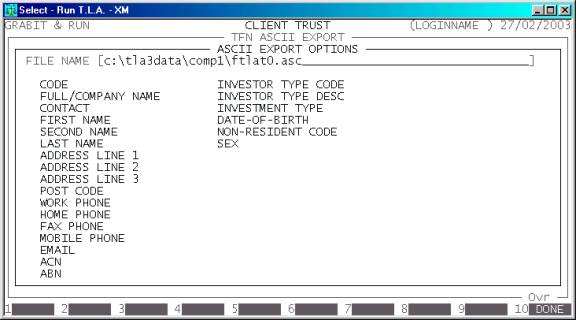Total
Legal Accounting 3
SECTION 1.5.3.6 - TAX FILE NUMBERS ASCII EXPORT
USAGE: To export a file detailing
all or a subset of the information on the Tax File Numbers (TFN) master-file.
This export file can then be used as input to other programs, such as
Spreadsheets, Databases and Word-processors. This gives you the flexibility to format
reports, etc. in ways not otherwise available in T.L.A. This export is not
suitable for Annual Investment Income Reports. For this, use the export in
Securities and Mortgages.
The file will always be created in TFN code order.
DISCUSSION: Initially the screen is
cleared and you will be asked, INCLUDE ALL TFN’S? If you enter, Y all TFN’s on file will be sent to the export file and no further limit questions will be asked. (Go to
the EXPORT FILE question.) If you press <ESC> you will be returned to the TAX FILE NUMBERS MENU. If you enter N, the
following series of questions will appear:
FROM TFN This is the lower limit of the TFN. Here you enter
the first TFN you wish printed. The default answer is blank. This will start
printing from the start of the TFN file.
TO TFN This is the upper limit of the TFN. Here you enter
the code of the last TFN you wish printed. The default answer is zzzzzzzzzz. This will end printing at the end of the TFN file.
This entry must not be less than the starting TFN code. If you choose the
default for both questions all TFN’s will be included.
At each point, when answering the above questions,
you can press <ESC> and the program will reset
and return you to the TAX FILE NUMBERS
MENU.
Next you will be presented with a page full of
questions. These relate to the exact fields and nature of the proposed export
file:

FILE NAME This field contains the name of the file you wish to
create. The default name is #FTLAT0.CSV (where # is replaced by the data directory name, eg. C:\TLA3DATA\COMP1\). However, this can be changed to any valid
DOS (or UNIX) path name. Be very careful if you enter a name suffixed by DAT, KEY, BAT, EXE or COM as it is possible to overwrite normal files used by T.L.A. In a DOS
environment, it is also possible to choose a name such as PRN or COM1 so that the export will be
sent directly to a printer or a communications port. T.L.A. will automatically
truncate the name from the first space encountered, so do not leave embedded
spaces or leading spaces in the name. T.L.A. will warn you if the file you are
about to create already exists.
FIELD NAMES Each field available in the
master-file may be individually chosen for export. Highlighted fields will be
exported. Low-lighted fields will be skipped. To toggle a field from highlight
to low-light, move the highlight bar over that filed and press <Enter> or the <Space> bar. You must choose to
export at least one field.
There are also function keys available for
manipulating FIELD NAMES:
<F4> This will return you to the FILE NAME entry.
<F5> This will highlight (export) all fields.
<F6> This will low-light (skip) all fields.
<F8> This will restore the field choices to the state
that they were before you entered the program.
<F9> This will open a screen that allows you to choose
the format of the fields exported. For further details, see APPENDIX B.
<F10> When you have finished choosing the fields you wish
exported, press <F10> to start the export
process.
When you have entered all the above information,
press <F10> and you will be asked START FILE CREATION? If you answer N, the
program will reset and return you to the TAX
FILE NUMBERS MENU. If you enter Y, the screen will clear and
the Matter master-file will be read in. During this time the computer will be
selecting account records according to the selection criteria you have just
entered will start writing the selected fields to the export file.
Like other reports, it is possible to stop the
export of the ASCII file by pressing <ESC>. However, the ASCII file
will have been created up to the point where you stopped it.
When the report has completed, T.L.A. will return
you to the TAX FILE NUMBERS MENU.